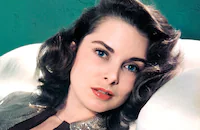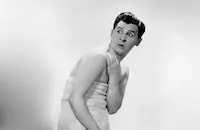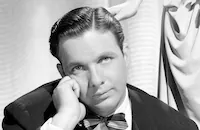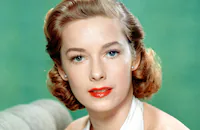Two Tickets to Broadway

Brief Synopsis
Cast & Crew
James V. Kern
Tony Martin
Janet Leigh
Gloria Dehaven
Eddie Bracken
Ann Miller
Film Details
Technical Specs

Synopsis
On a New York-bound bus, three young entertainers, S. F. "Foxy" Rogers, Joyce Campbell and Hannah Holbrook, curse their agent, Lew Conway, for booking them into a showboat revue in Vermont, which flopped after three days. Broke and hungry, the women eagerly greet Broadway hopeful Nancy Peterson, who boards the bus in Pelican Falls after a rousing sendoff, and share her box lunch. At the New York bus terminal, Nancy parts ways with the women, just as a discouraged singer, Dan Carter, arrives to catch a bus bound for home. Dan's fast-talking agent, Lew, rushes in to stop him from boarding by lying that the Vermont revue is a hit and needs a new leading man. As Dan is leaving the station with Lew, Nancy, who has discovered that her suitcase is missing, spots what she mistakenly believes is her luggage in Dan's hands and calls for the police. Nancy soon is reunited with her suitcase and apologizes, but when Dan graciously hails Nancy a taxi, the two suitcases are inadvertently switched. Later, armed with her bag, Dan tracks Nancy to a show business boardinghouse and learns that she has much in common with him. Dan then invites Nancy for a walk in Central Park and counsels her not to trust sophisticated, city-bred men. At Lew's place, meanwhile, Hannah, his long-suffering girl friend, berates Lew for his conniving ways, but becomes excited when he gets an idea to persuade Leo and Harry, owners of a Broadway delicatessen, to invest in a television act featuring Dan and the women. To that end, Lew arranges for actor Willard Glendon to impersonate Dennis McGiven, the producer of singer Bob Crosby's television show, and approach Dan in the deli. Glendon states that he admires Dan's voice and suggests that if he works up an act with some girls, they will be all but guaranteed a spot on Crosby's show. Leo and Harry witness Glendon's offer, and Dan and Lew convince them to sponsor the act. Nancy, who has joined the group, relays the good news to her parents in Pelican Falls, and soon the local newspaper is trumpeting her imminent television debut. Over the next few weeks, the group hones their act and Dan and Nancy fall in love. Lew, meanwhile, tries to see McGiven repeatedly, but is turned away. Just as Dan and the others begin to wonder if they will get their audition, Lew has Glendon show up at rehearsal posing as McGiven to announce that he has arranged for them to perform the act at a benefit, which Crosby is to attend. Although the benefit goes well, Glendon informs the group that Crosby is not interested in hiring them because Dan is too good a singer. The next day, an outraged Nancy storms onto Crosby's television studio set and denounces the singer. When a confused Crosby introduces Nancy to the real McGiven, however, Nancy runs off in tears. Humiliated and broken, Nancy then packs and heads for the bus station. At the same time, Dan shows up at the television studio to confront Crosby and learns that McGiven has been trying to contact him for months and would like him to appear on the show. Having finally gained admittance to the studio, Lew overhears Crosby say that he cannot use Dan on that night's show because he has already filled with spot with a French acrobatic team. Posing as a makeup artist, Lew locks the Frenchmen in a room, forcing Crosby to book Dan. With only an hour until air time, Lew discovers that Nancy is on a bus bound for home and jumps on board to retrieve her. Nancy refuses to believe Lew at first, but when the bus passes by a store selling televisions and she sees Dan singing opera on Crosby's show, she and Lew hop off and rush to the studio. Nancy arrives just in time to join Dan, Hannah, Foxy and Joyce on stage, and after their triumphant debut, she and Dan enjoy a long kiss.

Director
James V. Kern
Cast

Tony Martin

Janet Leigh

Gloria Dehaven

Eddie Bracken

Ann Miller

Barbara Lawrence
Joe Smith
Charles Dale

Taylor Holmes

Buddy Baer

Bob Crosby
The Charlivels
Jane Easton
Shirley Tegge
Martha O'brian
Lucy Knoch
Rosalee Calvert
Joan Shawlee
Joan Barton
Shirley Whitney
Marilyn Johnson
Barbara Freking
Mona Knox
Rosemary Knighton
Marie Thomas
Kathy Case
Eileen Coghlan

Joy Lansing
Linda Williams
Ann Zika
Libby Taylor
Gwen Caldwell
Jean Corbett
Helen Hayden
Claudette Thornton
Hazel Shaw
Barbara Logan
Charlotte Alpert
Victoria Lynn
Jeane Dyer
Pat Hall

Vera Miles
Maura Donatt
Frieda Stoll

Billy Curtis
Mike Lally
Bennett Green
Larry Barton
Gene Banks
Fred L. Gillett
Sid Tomack
Norval Mitchell
Helen Spring
Vincent Graeff
June Mccall
Noreen Mortensen
Joel Robinson
Georgia Clancy
Elizabeth Burgess
Barbara Thatcher
Carol Brewster
Shirley Buchanan
Mildred Carroll

Mara Corday
Carmelita Eskew

Joan Evans
Joanne Frank
Mary Ellen Gleason
Joan Jordan
Lola Kendrick
Shirley Kimball
Evelyn Lovequist
Kathleen O'malley
June Paul
Marylin Symons
Beverly Thomas
Joan Whitney
Barbara Worthington
Maxine Willis
Joann Arnold
Ann Melton
Ann Kramer
Marg Pemberton
John Sheehan
Ann Kimball
Don Blackman

Donald Macbride
Jimmy Dundee
Herman Cantor
Lillian West
Jack Gargan
Isabel Randolph
Miles Shepard
Bob Thom
Ralph Hodges
Michael Pierce

John Gallaudet
Millicent Deming
Jerry Hausner
Suzanne Ames
Anne O'neal
Lester Dorr
Charlete Hardy
Garry Owen
Tony Felice
Marty Rhiel
Duris De Jong
Gene Marshall
Marie Allison

George Nader
Crew
C. Bakaleinikoff
Jack Baker
Busby Berkeley
Mel Berns
Hal Borne
Jack Boyle
Sammy Cahn
Sammy Cahn
Leon Carr
Gower Champion
Marge Champion
Carroll Clark
Leo Corday
Edward Cronjager
Bob Crosby
Albert S. D'agostino
Eliot Daniel
Fred Fleck
Larry Germain
Lorenz Hart
Al Hoffman
Howard Hughes
Hal Kanter
James V. Kern
Sam Ledner
Ruggiero Leoncavallo
Harry Marker
Harley Miller
Morgan Padelford
Clem Portman
Leo Robin
Richard Rodgers
Walter Scharf
Darrell Silvera
Sid Silvers
Sid Silvers
Jule Styne
Harry Wild
Earl Wolcott
Michael Woulfe

Photo Collections
Videos
Movie Clip



Trailer
Film Details
Technical Specs

Award Nominations
Best Sound
Articles
Two Tickets to Broadway
During the same period, Janet Leigh's career had taken off, and she was one of MGM's busiest ingenues. Two Tickets to Broadway (1951) was her final film on a three-picture loanout to RKO. What should have been a simple (if all-star) musical of young showbiz hopefuls trying to get their break on a big-time television show turned into a much-delayed, months-long saga, in large part due to Hughes' over-involved attention to detail, and his efforts to seduce Leigh.
In Two Tickets to Broadway, Leigh plays a small-town girl who heads for New York. On the bus, she meets singer Tony Martin, and three other young hopefuls: Ann Miller, Gloria DeHaven, and Barbara Lawrence, and the trio becomes a quartet, finding lodgings at a theatrical boarding house. Eddie Bracken plays an inept agent, who tries to book them on a television show starring bandleader Bob Crosby, brother of Bing. The plot had been a cliche since the late 1920's "all talking! all singing! all dancing!" era, but it was freshened by the attractive young cast, and by substituting television stardom for Broadway success. The film had a generous dose of musical numbers, with songs by Jule Stein and Leo Robin, Rodgers and Hart, and even grand opera. The cast also featured vaudeville veterans Smith and Dale playing a pair of deli owners. It was one of their rare film appearances, and also their final one. Also playing bit parts in Two Tickets to Broadway were future stars Vera Miles, Mamie Van Doren (as Joan Olander, her real name), and George Nader.
As pre-production for Two Tickets to Broadway got underway, Leigh suggested that the hot young dance team of Marge and Gower Champion be hired to choreograph. She didn't know that the Champions had just been signed to a contract by MGM. However, the tenacious Hughes wangled a loan-out, and the Champions began working to turn non-dancer Leigh into a credible hoofer. Hughes had been trying to date Leigh for months without success. She was not interested, and kept turning him down, but finally gave in and agreed to a date if her parents to come along. Hughes complied, but after that date, she refused any more. Hughes kept pursuing, and kept delaying the start of production. One of Hughes' delaying tactics was how he dealt with sets. The film was being made at the RKO studios, and Hughes' office was at the Goldwyn studios. Instead of driving the few miles between the two studios to see the sets, Hughes insisted that the sets be dismantled at RKO, rebuilt at Goldw! yn so he could see and approve them, then dismantled again and rebuilt at RKO.
Leigh began dating the dance assistant she was working with, and Hughes assigned him to work with Martin instead. (Martin had his own personal experience with Hughes' obsessive pursuit of women ¿ in the late 1940s, Hughes had tried unsuccessfully to date Cyd Charisse, whom Martin was dating at the time, and later married). As the months dragged on, Leigh started dating Tony Curtis, and that romance turned serious, in spite of Hughes' attempts to prevent it. With no start of production in sight for Two Tickets to Broadway, Leigh returned to MGM to appear in It's a Big Country (1952). The Champions also had to return to MGM, to begin work on Show Boat (1951). They were replaced by Busby Berkeley. Finally, Leigh told Hughes she was going to New York, and wouldn't return until production began on Two Tickets to Broadway . Hughes finally relented, and filming began. About the only mishap during production was that Ann Miller fell off a huge pyramid during shooting of one of dance numbers. She suffered a back injury, and had to be hospitalized.
In spite of the delays, Two Tickets to Broadway turned out to be a pleasant diversion, with attractive players and appealing musical numbers. Janet Leigh married Tony Curtis, and the couple was a favorite of the fan magazines and public for the duration of their 11-year marriage. Howard Hughes became stranger and more reclusive, and eventually drove RKO into oblivion. He sold the studio in the mid-1950s.
Director: James V. Kern
Producer: Howard Hughes (uncredited), Jerry Wald, Norman Krasna
Screenplay: Sid Silvers, Hal Kanter, based on a story by Sammy Cahn
Cinematography: Edward Kronjager, Harry D. Wild
Editor: Harry Marker
Costume Design: Michael Woulfe
Art Direction: Albert S. D'Agostino, Carroll Clark; sets, Darrell Silvera, Harley Miller
Music: Jule Styne & Leo Robin; Richard Rodgers & Lorenz Hart; Leon Carr, Al Hoffman, & Leo Corday; Ruggero Leoncavallo; Sammy Cahn & Bob Crosby
Principal Cast: Tony Martin (Dan Carter), Janet Leigh (Nancy Peterson), Gloria DeHaven (Hannah Holbrook), Eddie Bracken (Lew Conway), Ann Miller (Joyce Campbell), Barbara Lawrence (S.F. Rogers), Bob Crosby (Himself), Joe Smith (Harry), Charles Dale (Leo). C-107m. Closed Captioning.
by Margarita Landazuri

Two Tickets to Broadway
Quotes
Trivia
The roles played by Charles Dale (I) and Joe Smith (II) were orginally intended for Stan Laurel and Oliver Hardy, who had to drop out of the film due to an illness contracted by Laurel while filming Atoll K (1950).
Notes
In the scene in which the acrobatics of the French group The Charlivels is shown, slow motion photography is used. Hollywood Reporter news items add the following information about the production: In September 1949, Ken Englund was announced as the film's scriptwriter and Alex Gottlieb as producer. Englund's contribution to the final film, if any, has not been determined. In April 1950, production was delayed for five months while a leading man was secured. Gottlieb was replaced as producer by Danny Dare in May, but in mid-August 1950, Dare left the production because of prior commitments. RKO head Howard Hughes then took over as producer. RKO borrowed Janet Leigh and Ann Miller from M-G-M. Dancers Marge and Gower Champion, who were also borrowed from M-G-M, coached Leigh during the delay. Virginia Carroll and Manny Harmon were announced as cast members, but their appearance in the final film has not been confirmed. Shirley Whitney, who plays a "girl" in the film, originally was hired as Janet Leigh's stand-in. Exterior street scenes were shot on Paramount's back lot. In mid-January 1951, production moved from RKO's Gower Street studios to the RKO-Pathé Studios in Culver City, CA.
Two Tickets to Broadway marked the screen debut of actress Vera Miles. It also marked the first time that Miles and Leigh, who played sisters in Alfred Hitchcock's 1960 film Psycho (see entry above), appeared together. The film received an Academy Award nomination for Best Sound Recording. Modern sources note that the picture lost $1,150,000 at the box office. Modern sources also state that during production, Hughes ordered the sets brought to the Samuel Goldwyn Studios, where Hughes spent most of his time, and had them assembled for his approval. The sets then were broken down and reassembled on the RKO lot a few miles away.

Miscellaneous Notes
Released in United States Fall November 1951
Released in United States Fall November 1951














